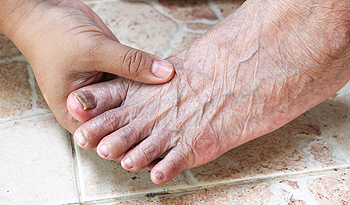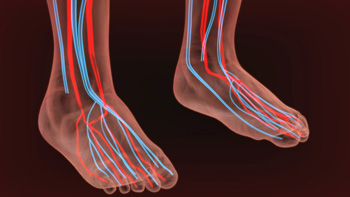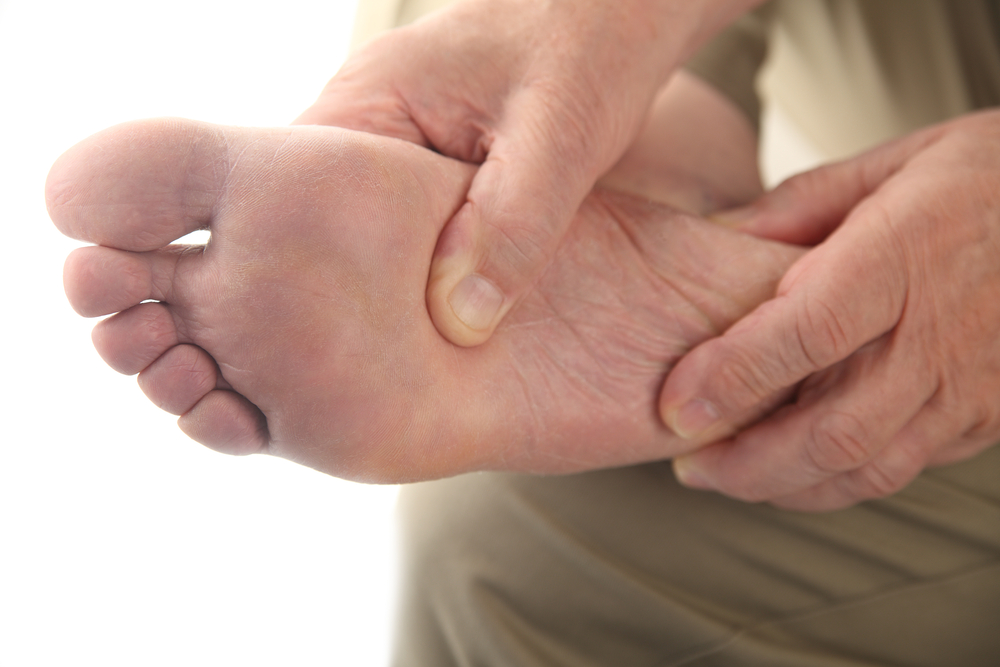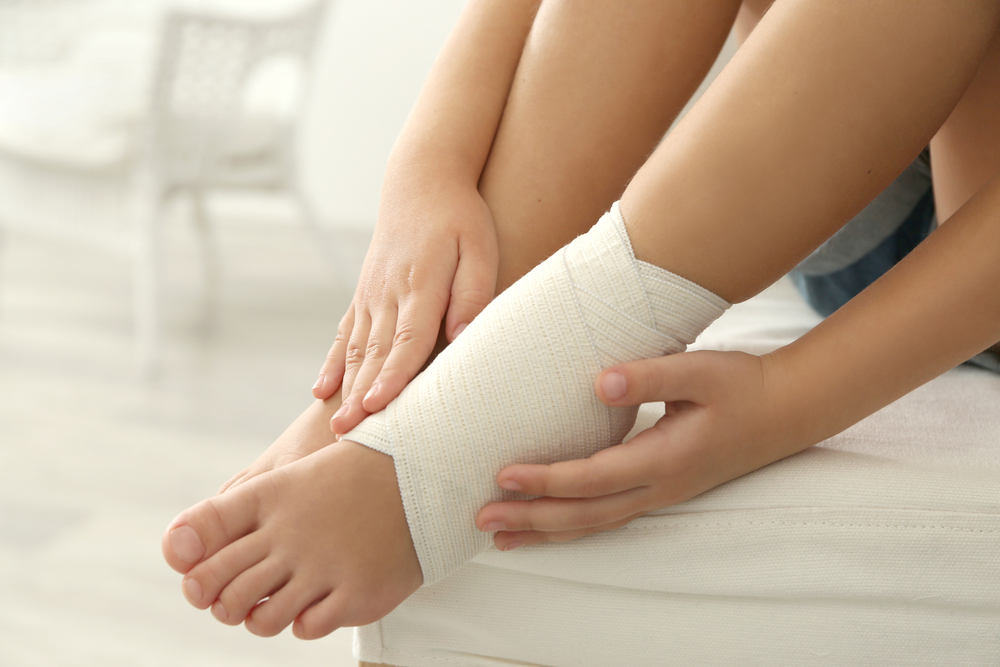Items filtered by date: November 2020
An Overview of Morton's Neuroma
Morton’s neuroma is a condition that occurs when a nerve located near the base of the toes becomes compressed. This condition causes pain in the ball of the foot that has a burning quality and numbness that radiates to nearby toes. The pain from Morton's neuroma often increases while walking or when the ball of the foot is squeezed. Sometimes, the pain is severe enough to interfere with walking, leading to a limp. If you have symptoms of Morton’s neuroma, it is suggested that you see a podiatrist. A podiatrist can examine the affected foot, order diagnostic imaging tests, and provide treatment options.
Morton’s neuroma is a very uncomfortable condition to live with. If you think you have Morton’s neuroma, contact Dr. John Branwell of Kearny, New Jersey. Our doctor will attend to all of your foot care needs and answer any of your related questions.
Morton’s Neuroma
Morton's neuroma is a painful foot condition that commonly affects the areas between the second and third or third and fourth toe, although other areas of the foot are also susceptible. Morton’s neuroma is caused by an inflamed nerve in the foot that is being squeezed and aggravated by surrounding bones.
What Increases the Chances of Having Morton’s Neuroma?
- Ill-fitting high heels or shoes that add pressure to the toe or foot
- Jogging, running or any sport that involves constant impact to the foot
- Flat feet, bunions, and any other foot deformities
Morton’s neuroma is a very treatable condition. Orthotics and shoe inserts can often be used to alleviate the pain on the forefront of the feet. In more severe cases, corticosteroids can also be prescribed. In order to figure out the best treatment for your neuroma, it’s recommended to seek the care of a podiatrist who can diagnose your condition and provide different treatment options.
If you have any questions, please feel free to contact our office located in Kearny, NJ . We offer the newest diagnostic and treatment technologies for all your foot care needs.
An Overview of Morton's Neuroma
Morton’s neuroma is a condition that occurs when a nerve located near the base of the toes becomes compressed. This condition causes pain in the ball of the foot that has a burning quality and numbness that radiates to nearby toes. The pain from Morton's neuroma often increases while walking or when the ball of the foot is squeezed. Sometimes, the pain is severe enough to interfere with walking, leading to a limp. If you have symptoms of Morton’s neuroma, it is suggested that you see a podiatrist. A podiatrist can examine the affected foot, order diagnostic imaging tests, and provide treatment options.
Morton’s neuroma is a very uncomfortable condition to live with. If you think you have Morton’s neuroma, contact Dr. John Branwell of Kearny, New Jersey. Our doctor will attend to all of your foot care needs and answer any of your related questions.
Morton’s Neuroma
Morton's neuroma is a painful foot condition that commonly affects the areas between the second and third or third and fourth toe, although other areas of the foot are also susceptible. Morton’s neuroma is caused by an inflamed nerve in the foot that is being squeezed and aggravated by surrounding bones.
What Increases the Chances of Having Morton’s Neuroma?
- Ill-fitting high heels or shoes that add pressure to the toe or foot
- Jogging, running or any sport that involves constant impact to the foot
- Flat feet, bunions, and any other foot deformities
Morton’s neuroma is a very treatable condition. Orthotics and shoe inserts can often be used to alleviate the pain on the forefront of the feet. In more severe cases, corticosteroids can also be prescribed. In order to figure out the best treatment for your neuroma, it’s recommended to seek the care of a podiatrist who can diagnose your condition and provide different treatment options.
If you have any questions, please feel free to contact our office located in Kearny, NJ . We offer the newest diagnostic and treatment technologies for all your foot care needs.
Read more about What is Morton's Neuroma?Are Bunions Affecting Your Everyday Life?
Are Bunions Affecting Your Everyday Life?
Ankle Sprains in Children
An ankle sprain can be a common injury during childhood. It occurs when the ankle is twisted or turned more than its normal range, causing the ligaments within the ankle to stretch or tear. Children might twist their ankles while playing, or while walking on an uneven surface. The symptoms of a sprained ankle include pain and swelling near the ankle joint, an inability to bear weight, bruising, tenderness, and a reduced range of motion in the affected ankle. Ankle sprains vary in severity from a mild grade one sprain where the ligaments overstretch, to a severe grade three sprain, in which the ligaments completely tear. If your child has symptoms of an ankle sprain, it is suggested that you seek the care of a podiatrist.
Ankle pain can be caused by a number of problems and may be potentially serious. If you have ankle pain, consult with Dr. John Branwell from Kearny, New Jersey. Our doctor will assess your condition and provide you with quality foot and ankle treatment.
Ankle pain is any condition that causes pain in the ankle. Due to the fact that the ankle consists of tendons, muscles, bones, and ligaments, ankle pain can come from a number of different conditions.
Causes
The most common causes of ankle pain include:
- Types of arthritis (rheumatoid, osteoarthritis, and gout)
- Ankle sprains
- Broken ankles
- Achilles tendinitis
- Achilles tendon rupture
- Stress fractures
- Bursitis
- Tarsal tunnel syndrome
- Plantar fasciitis
Symptoms
Symptoms of ankle injury vary based upon the condition. Pain may include general pain and discomfort, swelling, aching, redness, bruising, burning or stabbing sensations, and/or loss of sensation.
Diagnosis
Due to the wide variety of potential causes of ankle pain, podiatrists will utilize a number of different methods to properly diagnose ankle pain. This can include asking for personal and family medical histories and of any recent injuries. Further diagnosis may include sensation tests, a physical examination, and potentially x-rays or other imaging tests.
Treatment
Just as the range of causes varies widely, so do treatments. Some more common treatments are rest, ice packs, keeping pressure off the foot, orthotics and braces, medication for inflammation and pain, and surgery.
If you have any questions, please feel free to contact our office located in Kearny, NJ . We offer the newest diagnostic and treatment technologies for all your foot care needs.
Ankle Sprains in Children
An ankle sprain can be a common injury during childhood. It occurs when the ankle is twisted or turned more than its normal range, causing the ligaments within the ankle to stretch or tear. Children might twist their ankles while playing, or while walking on an uneven surface. The symptoms of a sprained ankle include pain and swelling near the ankle joint, an inability to bear weight, bruising, tenderness, and a reduced range of motion in the affected ankle. Ankle sprains vary in severity from a mild grade one sprain where the ligaments overstretch, to a severe grade three sprain, in which the ligaments completely tear. If your child has symptoms of an ankle sprain, it is suggested that you seek the care of a podiatrist.
Ankle pain can be caused by a number of problems and may be potentially serious. If you have ankle pain, consult with Dr. John Branwell from Kearny, New Jersey. Our doctor will assess your condition and provide you with quality foot and ankle treatment.
Ankle pain is any condition that causes pain in the ankle. Due to the fact that the ankle consists of tendons, muscles, bones, and ligaments, ankle pain can come from a number of different conditions.
Causes
The most common causes of ankle pain include:
- Types of arthritis (rheumatoid, osteoarthritis, and gout)
- Ankle sprains
- Broken ankles
- Achilles tendinitis
- Achilles tendon rupture
- Stress fractures
- Bursitis
- Tarsal tunnel syndrome
- Plantar fasciitis
Symptoms
Symptoms of ankle injury vary based upon the condition. Pain may include general pain and discomfort, swelling, aching, redness, bruising, burning or stabbing sensations, and/or loss of sensation.
Diagnosis
Due to the wide variety of potential causes of ankle pain, podiatrists will utilize a number of different methods to properly diagnose ankle pain. This can include asking for personal and family medical histories and of any recent injuries. Further diagnosis may include sensation tests, a physical examination, and potentially x-rays or other imaging tests.
Treatment
Just as the range of causes varies widely, so do treatments. Some more common treatments are rest, ice packs, keeping pressure off the foot, orthotics and braces, medication for inflammation and pain, and surgery.
If you have any questions, please feel free to contact our office located in Kearny, NJ . We offer the newest diagnostic and treatment technologies for all your foot care needs.
Read more about Ankle Pain
Who Can Trim My Toenails?
 The importance of taking care of your feet as the aging process occurs is crucial for possibly avoiding painful foot conditions. It is common that senior citizens have decreased circulation, and sores or wounds on the feet may take longer to heal. Many elderly people have difficulty trimming their toenails, and it often helps to see a podiatrist who can properly trim them on a frequent basis. Additionally, neuropathy is a common foot ailment among elderly people, and it can be difficult to feel existing bruises or cuts on the feet. If you are an elderly patient, it is strongly suggested that you are under the care of a podiatrist who can treat and prevent foot conditions.
The importance of taking care of your feet as the aging process occurs is crucial for possibly avoiding painful foot conditions. It is common that senior citizens have decreased circulation, and sores or wounds on the feet may take longer to heal. Many elderly people have difficulty trimming their toenails, and it often helps to see a podiatrist who can properly trim them on a frequent basis. Additionally, neuropathy is a common foot ailment among elderly people, and it can be difficult to feel existing bruises or cuts on the feet. If you are an elderly patient, it is strongly suggested that you are under the care of a podiatrist who can treat and prevent foot conditions.
Proper foot care is something many older adults forget to consider. If you have any concerns about your feet and ankles, contact Dr. John Branwell from Kearny, New Jersey. Our doctor can provide the care you need to keep you pain-free and on your feet.
The Elderly and Their Feet
As we age we start to notice many changes in our body, but the elder population may not notice them right away. Medical conditions may prevent the elderly to take notice of their foot health right away. Poor vision is a lead contributor to not taking action for the elderly.
Common Conditions
- Neuropathy – can reduce feeling in the feet and can hide many life-threatening medical conditions.
- Reduced flexibility – prevents the ability of proper toenail trimming, and foot cleaning. If left untreated, it may lead to further medical issues.
- Foot sores – amongst the older population can be serious before they are discovered. Some of the problematic conditions they may face are:
- Gouging toenails affecting nearby toe
- Shoes that don’t fit properly
- Pressure sores
- Loss of circulation in legs & feet
- Edema & swelling of feet and ankles
Susceptible Infections
Diabetes and poor circulation can cause general loss of sensitivity over the years, turning a simple cut into a serious issue.
If you have any questions please feel free to contact our office located in Kearny, NJ . We offer the newest diagnostic and treatment technologies for all your foot and ankle needs.
Who Can Trim My Toenails?
 The importance of taking care of your feet as the aging process occurs is crucial for possibly avoiding painful foot conditions. It is common that senior citizens have decreased circulation, and sores or wounds on the feet may take longer to heal. Many elderly people have difficulty trimming their toenails, and it often helps to see a podiatrist who can properly trim them on a frequent basis. Additionally, neuropathy is a common foot ailment among elderly people, and it can be difficult to feel existing bruises or cuts on the feet. If you are an elderly patient, it is strongly suggested that you are under the care of a podiatrist who can treat and prevent foot conditions.
The importance of taking care of your feet as the aging process occurs is crucial for possibly avoiding painful foot conditions. It is common that senior citizens have decreased circulation, and sores or wounds on the feet may take longer to heal. Many elderly people have difficulty trimming their toenails, and it often helps to see a podiatrist who can properly trim them on a frequent basis. Additionally, neuropathy is a common foot ailment among elderly people, and it can be difficult to feel existing bruises or cuts on the feet. If you are an elderly patient, it is strongly suggested that you are under the care of a podiatrist who can treat and prevent foot conditions.
Proper foot care is something many older adults forget to consider. If you have any concerns about your feet and ankles, contact Dr. John Branwell from Kearny, New Jersey. Our doctor can provide the care you need to keep you pain-free and on your feet.
The Elderly and Their Feet
As we age we start to notice many changes in our body, but the elder population may not notice them right away. Medical conditions may prevent the elderly to take notice of their foot health right away. Poor vision is a lead contributor to not taking action for the elderly.
Common Conditions
- Neuropathy – can reduce feeling in the feet and can hide many life-threatening medical conditions.
- Reduced flexibility – prevents the ability of proper toenail trimming, and foot cleaning. If left untreated, it may lead to further medical issues.
- Foot sores – amongst the older population can be serious before they are discovered. Some of the problematic conditions they may face are:
- Gouging toenails affecting nearby toe
- Shoes that don’t fit properly
- Pressure sores
- Loss of circulation in legs & feet
- Edema & swelling of feet and ankles
Susceptible Infections
Diabetes and poor circulation can cause general loss of sensitivity over the years, turning a simple cut into a serious issue.
If you have any questions please feel free to contact our office located in Kearny, NJ . We offer the newest diagnostic and treatment technologies for all your foot and ankle needs.
Read more about Taking Care of Elderly FeetWhat Are the Symptoms of Neuropathy?
 Neuropathy is a general term used to indicate damage to the peripheral nervous system. This controls the nerves in the body and is categorized into three groups. Blood pressure and sweat levels are controlled by the autonomic nerves, and the muscles of the body are moved by the motor nerves. The ability to feel cold, heat, or pain are controlled by the sensory nerves. Some of the symptoms that are associated with neuropathy can consist of muscle weakness, a numbing or tingling sensation that is generally noticed in the feet, and a burning or stabbing pain. Patients who are afflicted with diabetes may be prone to developing neuropathy. This may be a result of damage to the nerves that is caused by elevated sugar levels in the blood. It is recommended that you seek the counsel of a podiatrist if you have any of the above symptoms.
Neuropathy is a general term used to indicate damage to the peripheral nervous system. This controls the nerves in the body and is categorized into three groups. Blood pressure and sweat levels are controlled by the autonomic nerves, and the muscles of the body are moved by the motor nerves. The ability to feel cold, heat, or pain are controlled by the sensory nerves. Some of the symptoms that are associated with neuropathy can consist of muscle weakness, a numbing or tingling sensation that is generally noticed in the feet, and a burning or stabbing pain. Patients who are afflicted with diabetes may be prone to developing neuropathy. This may be a result of damage to the nerves that is caused by elevated sugar levels in the blood. It is recommended that you seek the counsel of a podiatrist if you have any of the above symptoms.
Neuropathy
Neuropathy can be a potentially serious condition, especially if it is left undiagnosed. If you have any concerns that you may be experiencing nerve loss in your feet, consult with Dr. John Branwell from Kearny, New Jersey. Our doctor will assess your condition and provide you with quality foot and ankle treatment for neuropathy.
What Is Neuropathy?
Neuropathy is a condition that leads to damage to the nerves in the body. Peripheral neuropathy, or neuropathy that affects your peripheral nervous system, usually occurs in the feet. Neuropathy can be triggered by a number of different causes. Such causes include diabetes, infections, cancers, disorders, and toxic substances.
Symptoms of Neuropathy Include:
- Numbness
- Sensation loss
- Prickling and tingling sensations
- Throbbing, freezing, burning pains
- Muscle weakness
Those with diabetes are at serious risk due to being unable to feel an ulcer on their feet. Diabetics usually also suffer from poor blood circulation. This can lead to the wound not healing, infections occurring, and the limb may have to be amputated.
Treatment
To treat neuropathy in the foot, podiatrists will first diagnose the cause of the neuropathy. Figuring out the underlying cause of the neuropathy will allow the podiatrist to prescribe the best treatment, whether it be caused by diabetes, toxic substance exposure, infection, etc. If the nerve has not died, then it’s possible that sensation may be able to return to the foot.
Pain medication may be issued for pain. Electrical nerve stimulation can be used to stimulate nerves. If the neuropathy is caused from pressure on the nerves, then surgery may be necessary.
If you have any questions, please feel free to contact our office located in Kearny, NJ . We offer the newest diagnostic and treatment technologies for all your foot care needs.
What Are the Symptoms of Neuropathy?
 Neuropathy is a general term used to indicate damage to the peripheral nervous system. This controls the nerves in the body and is categorized into three groups. Blood pressure and sweat levels are controlled by the autonomic nerves, and the muscles of the body are moved by the motor nerves. The ability to feel cold, heat, or pain are controlled by the sensory nerves. Some of the symptoms that are associated with neuropathy can consist of muscle weakness, a numbing or tingling sensation that is generally noticed in the feet, and a burning or stabbing pain. Patients who are afflicted with diabetes may be prone to developing neuropathy. This may be a result of damage to the nerves that is caused by elevated sugar levels in the blood. It is recommended that you seek the counsel of a podiatrist if you have any of the above symptoms.
Neuropathy is a general term used to indicate damage to the peripheral nervous system. This controls the nerves in the body and is categorized into three groups. Blood pressure and sweat levels are controlled by the autonomic nerves, and the muscles of the body are moved by the motor nerves. The ability to feel cold, heat, or pain are controlled by the sensory nerves. Some of the symptoms that are associated with neuropathy can consist of muscle weakness, a numbing or tingling sensation that is generally noticed in the feet, and a burning or stabbing pain. Patients who are afflicted with diabetes may be prone to developing neuropathy. This may be a result of damage to the nerves that is caused by elevated sugar levels in the blood. It is recommended that you seek the counsel of a podiatrist if you have any of the above symptoms.
Neuropathy
Neuropathy can be a potentially serious condition, especially if it is left undiagnosed. If you have any concerns that you may be experiencing nerve loss in your feet, consult with Dr. John Branwell from Kearny, New Jersey. Our doctor will assess your condition and provide you with quality foot and ankle treatment for neuropathy.
What Is Neuropathy?
Neuropathy is a condition that leads to damage to the nerves in the body. Peripheral neuropathy, or neuropathy that affects your peripheral nervous system, usually occurs in the feet. Neuropathy can be triggered by a number of different causes. Such causes include diabetes, infections, cancers, disorders, and toxic substances.
Symptoms of Neuropathy Include:
- Numbness
- Sensation loss
- Prickling and tingling sensations
- Throbbing, freezing, burning pains
- Muscle weakness
Those with diabetes are at serious risk due to being unable to feel an ulcer on their feet. Diabetics usually also suffer from poor blood circulation. This can lead to the wound not healing, infections occurring, and the limb may have to be amputated.
Treatment
To treat neuropathy in the foot, podiatrists will first diagnose the cause of the neuropathy. Figuring out the underlying cause of the neuropathy will allow the podiatrist to prescribe the best treatment, whether it be caused by diabetes, toxic substance exposure, infection, etc. If the nerve has not died, then it’s possible that sensation may be able to return to the foot.
Pain medication may be issued for pain. Electrical nerve stimulation can be used to stimulate nerves. If the neuropathy is caused from pressure on the nerves, then surgery may be necessary.
If you have any questions, please feel free to contact our office located in Kearny, NJ . We offer the newest diagnostic and treatment technologies for all your foot care needs.
Read more about Neuropathy



